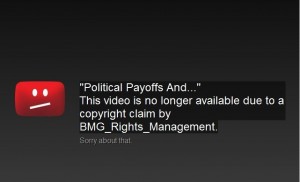On Video Takedowns and Copyright’s Temporary Monopoly
Every election season we are confronted with stories of online political videos being censored by overzealous copyright assertions.
Today’s story features an ad by the Romney campaign featuring President Obama singing the phrase “I’m so in love with you,” from a song by Al Green. (The ad argued Obama was giving more love to his donors than the middle class.) The ad was pulled down this week, after copyright owners claimed that the use of those few notes violated their rights.
Much of the discussion online has focused on fair use. Clearly this constituted fair use, as experts have pointed out, particularly in the case of political speech, when the full force of the First Amendment should be brought to bear in support of free expression. This probably put the infringement cart before the horse, however, because one only needs to prove fair use if one has taken something protectable. Given the brevity of the lyric and its relatively pedestrian text, it is questionable whether the content in the video actually took anything that federal law protects.

At first, YouTube dutifully took the video down on Monday, as it is compelled to do lest it face up to $150,000 in penalties. Yesterday, YouTube restored the video, but not without some legal risk, since it is required by the Digital Millennium Copyright Act (DMCA) to keep the accused content offline for at least 10 days or face liability. Of course, 10 days can be an eternity in a political campaign, but the DMCA’s time limits were not written with political speech in mind.
Since the first American copyright laws, we have conceived of copyright as a “temporary monopoly” – but this is not to say that all exercises of the exclusive right have a monopolistic effect. Indeed, many do not. If one author won’t license their vampire books for movie and television adaption, someone else will. An author of vampire stories does not own all vampire stories – just their own, and even then, that exclusive right is limited in various ways. And so countless authors can pen countless treatments of vampire stories, which is why we are knee deep in vampire books, vampire movies, vampire TV shows. Not to mention zombies. (An aside: Why is everyone on television these days undead? I didn’t notice when the living went out of fashion.) In this sense, owning the rights to any one work is not an economically significant monopoly because there are a infinite possibilities of permutations, countless substitutes.
Not so, however, in the case of the President singing Al Green. The message the Romney campaign wanted to send was that the President was in love with his donors, and naturally turned to video using the President’s own words – a common and frequently effective campaigning strategy. In fact, Romney’s campaign was responding to an Obama campaign ad recently used a clip of Romney singing “America the Beautiful,” now in the public domain, for a similar purpose. Yet in this case the President’s words were owned. One cannot dub in another lyric, or license a similar song. If the purpose is to allege that Obama had expressed his love for his donors, only the President’s words would do. Thus, the exclusive right allows a single rightsholder to invoke their federally-granted exclusivity not to secure remuneration for prior creativity, but to constrain the political discourse of the public.
In these cases, we should recognize that the shorthand term “temporary monopoly” applies in every sense of the word.








